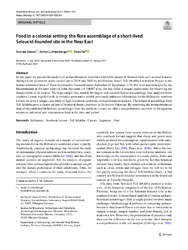Food in a colonial setting: the flora assemblage of a short-lived Seleucid-founded site in the Near East
DOI: https://doi.org/10.1007/s00334-020-00820-z
Persistent URL: http://resolver.sub.uni-goettingen.de/purl?gldocs-11858/10945
Persistent URL: http://resolver.sub.uni-goettingen.de/purl?gldocs-11858/10945
Orendi, Andrea; Lichtenberger, Achim; Tal, Oren, 2021: Food in a colonial setting: the flora assemblage of a short-lived Seleucid-founded site in the Near East. In: Vegetation History and Archaeobotany, Band 30, 5: 641 - 655, DOI: 10.1007/s00334-020-00820-z.
 |
Dokument öffnen: |
In this paper we present the analysis of archaeobotanical material retrieved by means of flotation from well-secured features during recent excavation work carried out in 2019 and 2020 by the German-Israeli Tell Iẓṭabba Excavation Project in the Seleucid-founded town of Nysa-Scythopolis. Founded under Antiochus IV Epiphanes (175–164 bce) and destroyed by the Hasmonaeans in the later years of John Hyrcanus (in 108/07 bce), the site offers a unique opportunity for observing the dietary habits of its settlers. The large sample size, namely the largest well-secured Seleucid assemblage ever analyzed in the southern Levant, together with its versatile provenance exhibit previously unknown information for the Hellenistic southern Levant vis-à-vis a unique case-study of high resolution systematic archaeobotanical analysis. The botanical assemblage from Tell Iẓṭabba gives a clearer picture of botanical dietary practices in Hellenistic Palestine. By presenting the archaeobotanical data of the published Hellenistic assemblages from the southern Levant, we offer a comprehensive overview of the agrarian resources cultivated and consumed as food at the time and period.


